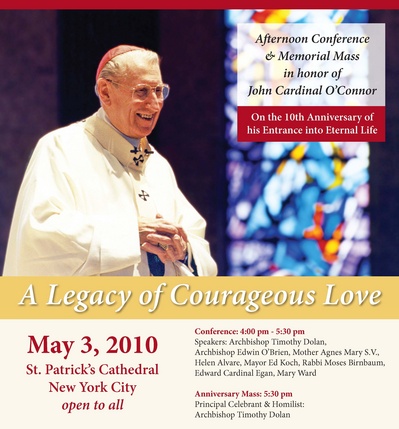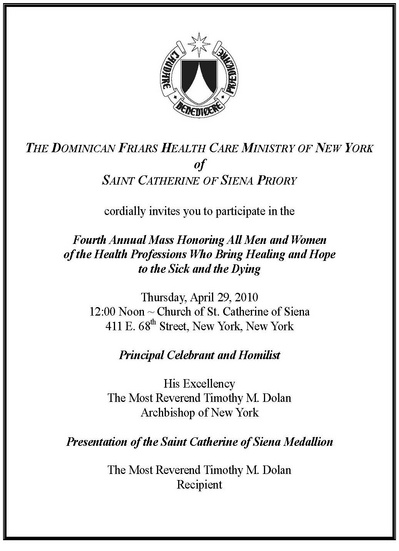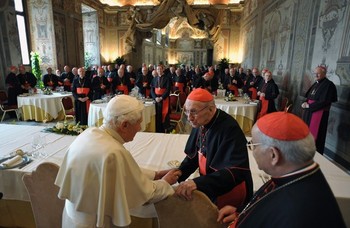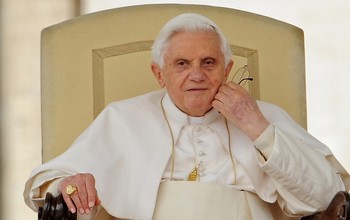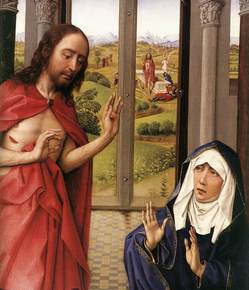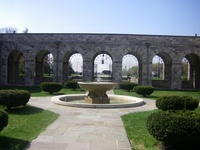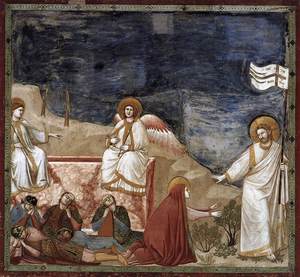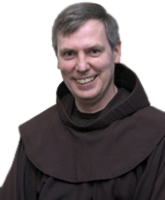 Not long ago President Obama appointed Franciscan Brother Daniel Sulmasy, MD, to the Presidential Commission for the Study of Bioethical Issues. He's universally well-received for his competence, compassion and humor. Oh, yes, the President did appoint a Catholic, a religious and a pro-life member to the commission.
Not long ago President Obama appointed Franciscan Brother Daniel Sulmasy, MD, to the Presidential Commission for the Study of Bioethical Issues. He's universally well-received for his competence, compassion and humor. Oh, yes, the President did appoint a Catholic, a religious and a pro-life member to the commission.April 2010 Archives
 Not long ago President Obama appointed Franciscan Brother Daniel Sulmasy, MD, to the Presidential Commission for the Study of Bioethical Issues. He's universally well-received for his competence, compassion and humor. Oh, yes, the President did appoint a Catholic, a religious and a pro-life member to the commission.
Not long ago President Obama appointed Franciscan Brother Daniel Sulmasy, MD, to the Presidential Commission for the Study of Bioethical Issues. He's universally well-received for his competence, compassion and humor. Oh, yes, the President did appoint a Catholic, a religious and a pro-life member to the commission.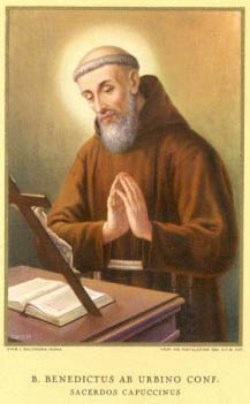 How beautiful upon the mountains are the feet of him who brings glad tidings; announcing peace, bearing good news, and telling of salvation (antiphon from Is 52:7)
How beautiful upon the mountains are the feet of him who brings glad tidings; announcing peace, bearing good news, and telling of salvation (antiphon from Is 52:7)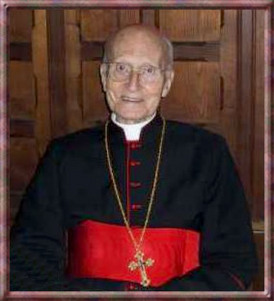 Paul Augustin Cardinal Mayer, OSB, died today just shy of his 99th birthday. He was the Church's eldest Prince.
Paul Augustin Cardinal Mayer, OSB, died today just shy of his 99th birthday. He was the Church's eldest Prince.The Church observes the liturgical memorial --though it's an optional one-- of the 16th century Dominican pope and saint, Pius V. This towering figure deserves some attention from us today given the various battles we face in the liturgical reform given by Pope Benedict or the persecution of Christians. Much of what we do today in liturgical obedience, church discipline and seminary formation is the result of the work of Pope Saint Pius V. The following text is taken from Dom Prosper Gueranger's The Liturgical Year. Gueranger's style and examination of Pius is romantic it is nonetheless attentive to some important details (the entire entry from the Liturgical Year is not presented here).
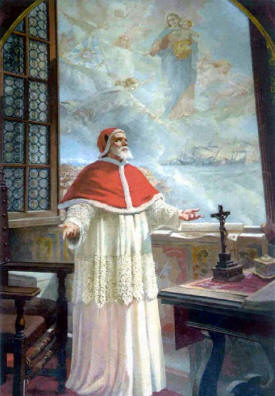
We have already met with the names of several Pontiffs on the Paschal Calendar. They form a brilliant constellation around our Risen Jesus, who, during the period (ed. on the old Tridentine calendar) between his Resurrection and Ascension, gave to Peter, their predecessor, the keys of the kingdom of heaven. Anicetus, Soter, Caius, Cletus and Marcellinus, held in their hands the palm of martyrdom: Leo was the only one who did not shed his blood in the cause of his divine Master, Today there comes before us a holy Pope who governed the Church in these latter times; he is worthy to stand amidst the Easter group of Pontiffs. Like Leo, Pius V was zealous in combating heresy; Like Leo, he saved his people from the barbarian yoke.
The whole life of Pius V was a combat. His pontificate fell during those troubled times when Protestantism was leading whole countries into apostasy. Italy was not a prey that could be taken by violence: artifice was therefore used, in order to undermine the Apostolic See and thus develop the whole Christian world into the darkness of heresy. Pius defended the Peninsula with untiring devotedness from the danger that threatened her. Even before he was raised to the Papal Throne he frequently exposed his life by his zeal in opposing the preaching of false doctrines. Like Peter the Martyr, he braved every danger and was the dread of the emissaries of heresy. When seated on the Chair of Peter, he kept the innovators in check by fear, roused the sovereigns of Italy to energy and by measures of moderate severity drove back beyond the Alps the torrent that would have swept Christianity from Europe had not the Southern States thus opposed it. From that time forward, Protestantism has never made any further progress: it has been wearing itself out by doctrinal anarchy. We repeat it: this heresy would have laid all Europe waste, had it not been for the vigilance of the pastor who animated the defenders of truth to resist it where it already existed, and who set himself as a wall of brass against its invasion in the country where he himself was the master.
Another enemy, taking advantage of the confusion caused in the West by Protestantism, organized an expedition against Europe. Italy was to be its first prey. The Ottoman fleet started from the Bosphorus. This again would have meant the ruin of Christendom but for the energy of the Roman Pontiff, our Saint. He gave the alarm, and called the Christian Princes to arms. Germany and France, torn by domestic factions that had been caused by heresy, turned a deaf ear to the call. Spain alone, together with Venice and the little Papal fleet, answered the summons of the Pontiff. The Cross and Crescent were soon face to face in the Gulf of Lepanto. The prayers of Pius V decided the victory in favour of the Christians, whose forces were much inferior to those of the Turks. We shall return to this important event when we come to the Feast of the Rosary in October. But we cannot omit to mention today the prediction uttered by the holy Pope, on the evening of the great day of October 7, 1571. The battle between the Christian and Turkish fleets lasted from six o'clock in the morning till late in the afternoon. Towards evening, the Pontiff suddenly looked up towards heaven, and gazed upon it in silence for a few seconds. Then turning to his attendants, he exclaimed: "Let us give thanks to God! The Christians have gained victory!" The news soon arrived at Rome; and thus, Europe once more owed her salvation to a Pope! The defeat at Lepanto was a blow from which the Ottoman Empire has never recovered: its fall dates from that glorious day.
The zeal of this holy Pope for the reformation of Christian morals, his establishment of the observance of the laws of discipline prescribed by the Council of Trent and his publication of the new Breviary and Missal have made his six years' pontificate to be one of the richest periods of the Church's history. Protestants themselves have frequently expressed their admiration of this vigorous opponent of the so-called Reformation. "I am surprised," said Bacon, "that the Church of Rome has not yet canonized this great man." Pius V did not receive this honour till about a hundred and thirty years after his death; so impartial is the Church, when she has to adjudicate this highest of earthly honours even to her most revered Pastors!
The heretics attempted more than once to destroy a life which baffled all their hopes of perverting the faith of Italy. By a base and sacrilegious stratagem, aided by treachery, they put a deadly poison on the feet of the crucifix which the Saint kept in his Oratory, and which he was frequently seen to kiss with great devotion. In the fervour of prayer, Pius was about to give his mark of love to the image of his crucified Master, when suddenly the feet of the crucifix detached themselves from the Cross and eluded the proffered kiss of the venerable old man. The Pontiff at once saw through the plot whereby his enemies would fain have turned the life-giving Tree into an instrument of death.
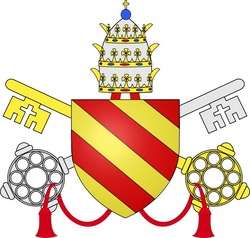
In order to encourage the faithful to follow the sacred Liturgy, we will select another interesting example from the life of the great Saint. When lying on his bed of death, and just before breathing his last, he took a parting look at the Church on earth, which he was leaving for that of heaven, he wished to make a final prayer for the flock which he knew was surrounded by danger; he therefore recited, but with a voice that was scarcely audible, the following stanza of the Paschal hymn: "We beseech thee, O Creator of all things that in these days of Paschal joy, thou defend thy people from every assault of death!"
Pontiff of the living God, thou wast,
whilst on earth, the pillar of iron and wall of brass, spoken of by the prophet
(Jer I,18). Thine unflinching firmness preserved the flock entrusted to thee
from the violence and snares of its many enemies. Far from desponding at
the sight of the dangers thou didst redouble thy courage just as men raise the
embankments higher when they see the torrent swell. By thee was the spread of
heresy checked; by thee was the Mussulman (i.e., a Muslim) invasion repelled,
and the haughty Crescent humbled. God honoured thee by choosing thee as
the avenger of his glory and the deliverer of Christian people: receive our thanks
and the homage of our humble praise! By thee were repaired the injuries done to
the Church during a period of unusual trial. The true reform - the reform
that is wrought by authority - was vigorously applied by thy strong and holy
hand. To thee is due the restoration of the Divine Service by the
publication of the books of holy Liturgy. And all these glorious deeds
were done in the six short years of thy laborious pontificate!
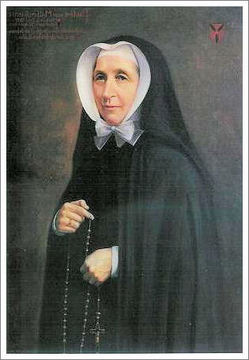 In her retreat of 1843, Blessed Pauline von Mallinckrodt wrote in her notes,
In her retreat of 1843, Blessed Pauline von Mallinckrodt wrote in her notes, 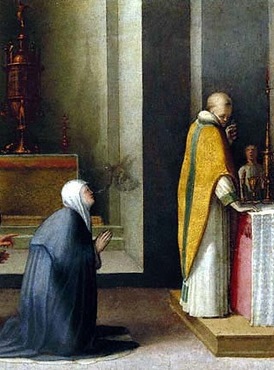
The love of God has been poured into our hearts, alleluia, by His spirit living in us, alleluia.
God of wisdom, You made Saint Catherine burn with divine love in contemplating the Lord's passion and in serving Your Church. With the help of her prayers may Your people, united in the mystery of Christ, rejoice forever in the revelation of His glory.
Ordination season is upon us. That is, you'll may be hearing of or attending episcopal, priestly and diaconal ordination ceremonies. If you get the opportunity please attend an ordination ceremony. In reading Saint Catherine of Siena's Dialogues, I thought her dialogue "The Qualities of Good Ministers in the Church" (119) as an appropriate reflection for all engaged in seminary formation at one level or another and for those already in service to the Church. Saint Catherine said:
I told you that [my ministers] have taken on the qualities of the sun. Indeed, they are suns, for there is in them no darkness of sin or ignorance, because they follow the teaching of my Truth. Nor are they lukewarm, because they are set ablaze in the furnace of my charity. They have no use for the world's honors and ranks and pleasures. Therefore, they are not afraid to correct. Those who do not hanker after power or ecclesiastical rank have no fear of losing it. They reprove [sin] courageously, for those whose conscience does not accuse them of sin have nothing to fear.
So this pearl [of justice] was not clouded over in these anointed ones, these christs of mine, of whom I have told you. [St Catherine here is referring to holy people of the past who showed themselves to be good ministers, and whose qualities are always needed in the Churcch]. No, it was luminous. They embraced voluntary poverty and sought after lowliness with deep humility. This is why they are not annoyed by people's derision or abuse or slander, or by the insult or shame or pain or torture. They were cursed, and they blessed. They endured with true patience, likely angels and more than angels -not by nature, but because of the sacramental grace given them from above to be the stewards of the body and blood to my only begotten Son.
How humbly they governed and communicated with their subjects! With what hope and lively faith! They had no fear or worry that either they or their subjects would be lacking in temporal goods, so they generously gave out the Church's possessions to the poor. Thus they fulfilled to the utmost their obligation to divide their temporal goods to meet their own needs and those of the poor and the Church. they set nothing aside, and after their death there was no great estate to settle; in fact, some of them left the Church in debt for the sake of the poor--all because of their generous charity and their trust in my providence. They were strangers to slavish fear, so they were confident they would lack nothing, either spiritually or temporally.
Because I had
appointed them to such dignity for the salvation of souls, they never rested,
good shepherds that they were, from gathering the little sheep into the
sheepfold of holy Church. In their love and hunger for souls they even laid
down their lives to rescue them from the devils' hands (cf. Jn 10). They made
themselves weak along with those who were weak. That is, to keep the weak from
being confounded with despair and to give them more room to expose their
weakness, they would slow their own weakness, saying, "I am weak along with
you." They wept with those who wept and rejoiced with those who rejoiced (cf. 1
Cor. 9:22; Rom 12:15). Thus they knew how to give everyone the right food ever
so tenderly. They encouraged the good by rejoicing in their goodness, for they
were not gnawed up with envy but broad in generosity of their neighbors and
subjects. Those who were sinful they drew out of their sin by showing that they
themselves were also sinful and weak. Their compassion was true and holy, and
while correcting others and imposing penances for the sins they had committed,
they themselves in their charity did penance along with them. Because of their
love, they who were imposing the penance suffered more than those who received
it. And sometimes some of them actually did the same penance themselves,
especially when they saw that it seemed very difficult for the penitent. And by
that act the difficulty became sweet for them.
(Sr. Mary O'Driscoll, OP, Catherine of Siena: Passion for the Truth, Compassion for Humanity, Hyde Park: New City Press, 1993).
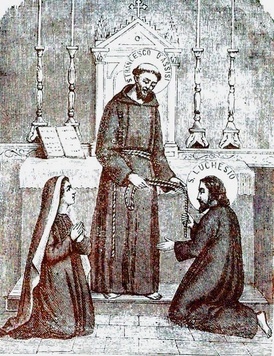
The Holy Father addressed Vox Clara during a lunch meeting, and approved the new translation of the 2002 Roman Missal. This is tremendous news. I look forward to praying the new texts! Not a perfect text but one that's more theologically correct than the current missal. Some work still needs to be done but that ought to be finished shortly so that publishers, musicians, priests, and laity can make the new texts available for the anticipated inauguration for the First Sunday of Advent 2011. Each of the 11 English speaking conferences of bishops will get to work on rolling out the new missal in their countries with the proper catechetical formation for clergy and laity alike. The Pope's words today:
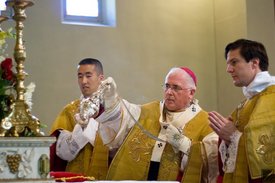
I thank you for the work that Vox Clara has done over the last eight years, assisting and advising the Congregation for Divine Worship and the Discipline of the Sacraments in fulfilling its responsibilities with regard to the English translations of liturgical texts. This has been a truly collegial enterprise. Not only are all five continents represented in the membership of the Committee, but you have been assiduous in drawing together contributions from Bishops' Conferences in English-speaking territories all over the world. I thank you for the great labour you have expended in your study of the translations and in processing the results of the many consultations that have been conducted. I thank the expert assistants for offering the fruits of their scholarship in order to render a service to the universal Church. And I thank the Superiors and Officials of the Congregation for their daily, painstaking work of overseeing the preparation and translation of texts that proclaim the truth of our redemption in Christ, the Incarnate Word of God.
Saint Augustine spoke beautifully of the relation between John the Baptist, the vox clara that resounded on the banks of the Jordan, and the Word that he spoke. A voice, he said, serves to share with the listener the message that is already in the speaker's heart. Once the word has been spoken, it is present in the hearts of both, and so the voice, its task having been completed, can fade away (cf. Sermon 293). I welcome the news that the English translation of the Roman Missal will soon be ready for publication, so that the texts you have worked so hard to prepare may be proclaimed in the liturgy that is celebrated across the anglophone world. Through these sacred texts and the actions that accompany them, Christ will be made present and active in the midst of his people. The voice that helped bring these words to birth will have completed its task.
A new task will then present itself, one which falls outside the direct competence of Vox Clara, but which in one way or another will involve all of you - the task of preparing for the reception of the new translation by clergy and lay faithful. Many will find it hard to adjust to unfamiliar texts after nearly forty years of continuous use of the previous translation. The change will need to be introduced with due sensitivity, and the opportunity for catechesis that it presents will need to be firmly grasped. I pray that in this way any risk of confusion or bewilderment will be averted, and the change will serve instead as a springboard for a renewal and a deepening of Eucharistic devotion all over the English-speaking world.
Dear Brother Bishops, Reverend
Fathers, Friends, I want you to know how much I appreciate the great
collaborative endeavour to which you have contributed. Soon the fruits of your
labours will be made available to English-speaking congregations everywhere. As
the prayers of God's people rise before him like incense (cf. Psalm 140:2), may
the Lord's blessing come down upon all who have contributed their time and
expertise to crafting the texts in which those prayers are expressed. Thank
you, and may you be abundantly rewarded for your generous service to God's
people.
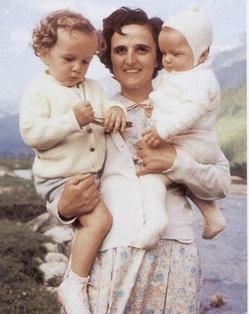
Holy Spirit, Source of every perfection, give us wisdom, intelligence, and courage so that, following the example of Saint Gianna and through her intercession, we may know how to place ourselves at the service of each person we meet in our personal, family and professional lives, and thus grow in love and holiness. Amen.
As Saint Gianna said, "Every vocation is a call to motherhood or fatherhood, earthly, spiritual or moral. God has placed in us an instinct for life. A priest is a father, nuns are mothers, mothers of souls."
Read the Holy See's biography of Saint Gianna Berretta Molla
On this feast of Saint Gianna we look for heavenly assistance with the certain hope that our prayers will be answered. Our prayerful request of Saint Gianna is for her to ask the Lord for abundant graces to carry on the great work of Catholic Healthcare in New York and beyond at The Gianna Center --The Catholic Healthcare Center Women. It's Pro-life, Pro-woman, Pro-Marriage, Pro-family and Pro-God!!!!
The Roman calendar of saints lists Saint Peter Canisius' feast day as December 21; on the Jesuit ordo his feast is observed today.
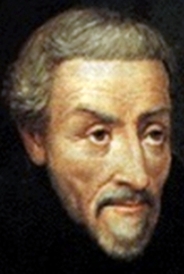
Saint Peter Canisius is well known for his theological expertise, his teaching and preaching and the work of evangelization he did in Germany and other places where the Protestants destroyed the unity of the Church. His approach to theological engagement is noteworthy for his judgment based on prudence and charity. Saint Peter neither wanted to heighten division nor to embitter relations with the Magisterial Reformers with intellectual engagement on the "hot button issues" because in his mind, theological disputation only succeeded in fueling deeper resentment and hysteria toward the Catholics and did not advance the argument and knowledge of the Truth. In a letter to his Jesuit superior, Saint Peter Canisius said:
It is plainly wrong to meet non-Catholics with bitterness or to treat them with discourtesy. For this is nothing else than the reverse of Christ's example because it breaks the bruised reed and quenches the smoking flax. We ought to instruct with meekness those whom heresy has made bitter and suspicious, and has estranged from orthodox Catholics, especially from our fellow Jesuits.
Thus, by whole-hearted charity and good will we may win them over to us in the Lord. Again, it is a mistaken policy to behave in a contentious fashion and to start disputes about matters of belief with argumentative people who are disposed by their very natures to wrangling. Indeed, the fact of their being so constituted is a reason the more why such people should be attracted and won to the simplicity of the faith as much by example as by argument.
With Saint Peter Canisius, let us pray:
Let my eyes take their sleep, but may my heart always keep watch for you.
May your right hand bless your servants who love you. May I be united with the praise that flows from you, Lord Jesus, to all your saints; united with the gratitude drawn from your heart, good Jesus, that causes your saints to thank you; united with your passion, good Jesus, by which you took away our guilt; united with the divine longing that you had on earth for our salvation; united with every prayer that welled from your divine heart, good Jesus, and flowed into the hearts of your saints. Amen.
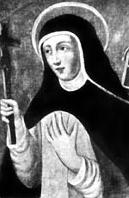 God of compassion, enkindle anew in our hearts the
love of your cross. By the life and prayers of Blessed Osanna, who suffered for
the unity of the Church, may we become sharers in both your passion and your
glory.
God of compassion, enkindle anew in our hearts the
love of your cross. By the life and prayers of Blessed Osanna, who suffered for
the unity of the Church, may we become sharers in both your passion and your
glory.
In his 2010 message for World Day of Vocations, celebrated today on Good Shepherd Sunday, Pope Benedict names three elements for someone willing to follow a call to priesthood and/or religious life: friendship with Jesus, total self-gift to God and a life of communion with all people. All of this situated in the sacrifice of Christ on the Cross and our relationship to that very cross. Read the three essential paragraphs from the Pope's message below.
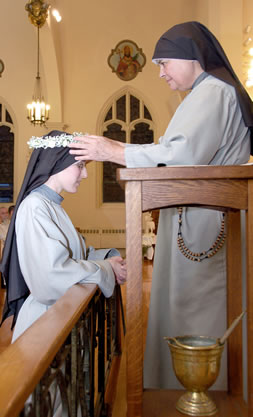
A fundamental element, one which can be seen in every vocation to the priesthood and the consecrated life, is friendship with Christ. Jesus lived in constant union with the Father and this is what made the disciples eager to have the same experience; from him they learned to live in communion and unceasing dialogue with God. If the priest is a "man of God", one who belongs to God and helps others to know and love him, he cannot fail to cultivate a deep intimacy with God, abiding in his love and making space to hear his Word. Prayer is the first form of witness which awakens vocations. Like the Apostle Andrew, who tells his brother that he has come to know the Master, so too anyone who wants to be a disciple and witness of Christ must have "seen" him personally, come to know him, and learned to love him and to abide with him.
Another aspect of the consecration belonging to the priesthood and the religious life is the complete gift of oneself to God. The Apostle John writes: "By this we know love, that he laid down his life for us; and therefore we ought to lay down our lives for the brethren" (1 Jn 3:16). With these words, he invites the disciples to enter into the very mind of Jesus who in his entire life did the will of the Father, even to the ultimate gift of himself on the Cross. Here, the mercy of God is shown in all its
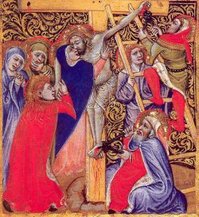
fullness; a merciful love that has overcome the darkness of evil, sin and death. The figure of Jesus who at the Last Supper, rises from the table, lays aside his garments, takes a towel, girds himself with it and stoops to wash the feet of the Apostles, expresses the sense of service and gift manifested in his entire existence, in obedience to the will of the Father (cf. Jn 13:3-15). In following Jesus, everyone called to a life of special consecration must do his utmost to testify that he has given himself completely to God. This is the source of his ability to give himself in turn to those whom Providence entrusts to him in his pastoral ministry with complete, constant and faithful devotion, and with the joy of becoming a companion on the journey to so many brothers and sisters, enabling them too to become open to meeting Christ, so that his Word may become a light to their footsteps. The story of every vocation is almost always intertwined with the testimony of a priest who joyfully lives the gift of himself to his brothers and sisters for the sake of the Kingdom of God. This is because the presence and words of a priest have the ability to raise questions and to lead even to definitive decisions (cf. John Paul II, Post-Synodal Apostolic Exhortation Pastores Dabo Vobis, 39).
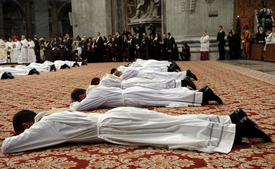
A third aspect which necessarily characterizes the
priest and the consecrated person is a life of communion. Jesus showed that the
mark of those who wish to be his disciples is profound communion in love: "By
this all men will know that you are my disciples, if you have love for one
another" (Jn 13:35). In a particular way the priest must be a man of communion,
open to all, capable of gathering into one the pilgrim flock which the goodness
of the Lord has entrusted to him, helping to overcome divisions, to heal rifts,
to settle conflicts and misunderstandings, and to forgive offences. In July 2005,
speaking to the clergy of Aosta, I noted that if young people see
priests who appear distant and sad, they will hardly feel encouraged to follow
their example. They will remain hesitant if they are led to think that this is
the life of a priest. Instead, they need to see the example of a communion of
life which can reveal to them the beauty of being a priest. Only then will a
young man say, "Yes, this could be my future; I can live like this" (Insegnamenti
I, [2005], 354). The Second
Vatican Council, in speaking of the witness that awakens vocations,
emphasizes the example of charity and of fraternal cooperation which priests
must offer (cf. Decree Optatam
Totius, 2).
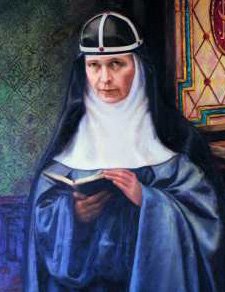 Today is the 10th anniversary of the beatification of Mother Maria Elizabeth Hesselblad, the woman who re-established the Swedish branch of the Order of the Most Holy Savior of Saint Bridget --Bridgettine Order after centuries of the charism's absence, in 1911. This is the order of nuns founded by Saint Bridget (Birgitta) of Sweden (1303-1373).
Today is the 10th anniversary of the beatification of Mother Maria Elizabeth Hesselblad, the woman who re-established the Swedish branch of the Order of the Most Holy Savior of Saint Bridget --Bridgettine Order after centuries of the charism's absence, in 1911. This is the order of nuns founded by Saint Bridget (Birgitta) of Sweden (1303-1373).
Saint Bridget of Sweden, not to be confused with the Irish saint, was named co-paroness of Europe on October 1, 1999.
Today the order numbers some 700 sisters in 50 houses around the world. In the USA, there is one house of Bridgettine nuns, in Darien, Connecticut, in the Diocese of Bridgeport. The order has about a 4% growth per annum with about 30 novices entering yearly. Info on Wiki can be read here.
There is a group of Bridgetine monks in Oregon, themselves re-founded in 1976.
Blessed Maria Elizabeth Hesselblad's liturgical memorial is June 4.
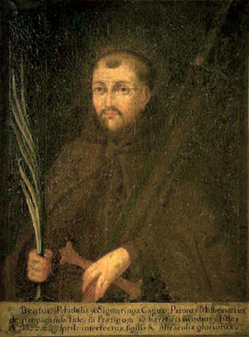 I thank Christ Jesus our Lord, who has strengthened me, that he has made me his servant and judged me faithful, alleluia.
I thank Christ Jesus our Lord, who has strengthened me, that he has made me his servant and judged me faithful, alleluia. There's a good excerpted interview published by Christianity Today from 2005 with Bono (of U2 fame) about his faith, Scripture and Christ is insightful and dare I say, heart-warming.
There's a good excerpted interview published by Christianity Today from 2005 with Bono (of U2 fame) about his faith, Scripture and Christ is insightful and dare I say, heart-warming.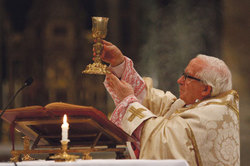
Curious to what others think, I was elated to see the connections the Prefect of the Congregation for Divine Worship (Rome), Cardinal Antonio Cañizares Llovera, made with the sacred Liturgy in an interv: evangelization, civilization and freedom. It is not very surprising to me that the Prefect of this particular Vatican office said that the Liturgy is the vehicle for our intellectual and cultural renewal. It is new data for those see the Church's liturgical life as a method for community organizing and feeling good about themselves. I was surprised however, that the Cardinal indicated that the Pope is in favor of Sacrosanctum Concilium. Not that the Pope is radically in disfavor of it but that the Pope's committed to the document. With all that document's flaws and the misinterpretations, this is something for me to chew on. May be the Pope is right in that we have to re-evaluate our interpretation of SC. Since 2013 is the 50th anniversary of SC, I am hoping for a brilliant liturgical letter from the Pope. Ultimately, the point is, do we really know what the sacred Liturgy is and how it is a path unto our eternal destiny? Do we really understand that the Liturgy, not our ideology, sets bar for our interior conversion?
Here are some excerpts of the Cardinal's interview:
"To evangelise the culture means having one's gaze fixed on Christ because a man who accepts Christ - who is truly man - will have Christ's mentality, thoughts, and feelings," he said.
"[To build] a civilisation of love, as John Paul II and Benedict XVI have called for, seems to be a work of evangelisation because in such a society, God really is recognized as God. The problem of our times is a culture built without God."
When it comes to re-evangelising the West in general he [the Cardinal] pointed to the example of St Benedict of Norcia and his search for God and imitation of Christ. But changing the mentality, he said, includes measures such as "renewing the liturgy", reintroducing a "correct sense of freedom" and presenting "a true and stronger" sense of religiosity.
Being of similar mind to Benedict XVI he [the Cardinal] naturally has the same approach to the liturgy which he sees not only as important for the Church, but also for the world at large.
"Benedict XVI reminds us that the first document of the Second Vatican Council was Sacrosanctum Concilium [the Constitution on the Sacred Liturgy], and the last document was Gaudium et Spes, [the Pastoral Constitution on the Church in the Modern World]." he said.
"If we want to be present as Christians in the world, to form and renew the world, to bring peace, freedom et cetera, we cannot do that without leaning on the liturgy, on Sacrosanctum Concilium. For this reason, the Holy Father is very committed to renew the liturgy, to recover Sacrosanctum Concilium."
"The liturgy is the first banquet of God; it's where we can
identify God, it's prayer, it's where we can discover salvation, the work of
Grace - all of which are God's initiative," he said. "When this is
lived, when it is at the centre of one's life, the heart changes, the mentality
changes, and also society."
~Taken from Edward Pentin's Catholic Herald article of April 16, 2010.
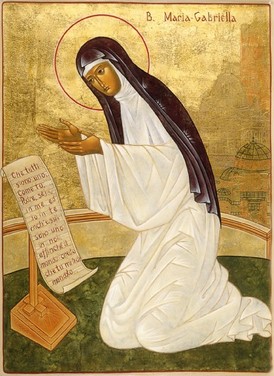
Lord God, eternal Shepherd, You inspired the blessed virgin, Maria Gabriella, generously to offer up her life for the sake of Christian unity. At her intercession, hasten, we pray, the coming of the day when, gathered around the table of Your word and of Your Bread from heaven, all who believe in Christ may sing Your praises with a single heart, a single voice.
Blessed Maria Gabriella, Sardinian by birth in 1914, she died a Trappistine nun in 1939 at Grottaferrata, having entered the monastery four years earlier. Taking up the invitation to work for spiritual ecumenism among Christians from Father Paul Couturier who stressed that all Christians must learn to pray together for unity in union with Jesus' own prayer for the same (Jn 17). Couturier advocated a spiritual unity founded on common prayer, charity, friendship, mutual forgiveness and humility which precedes doctrinal and hierarchical unity.
Father Couturier's work found a natural habitat in the monastic life which then became fruitful among the wider church (he called the latter the invisible monastery). As a side note, Couturier was greatly influenced by the his work in Lyon, France and by Dom Lambert Beaudoin and the monks of the Belgian abbey of Amay-sur-Meuse (now at Chevetogne).
Blessed Maria Gabriella's offering of self in 1938 for the spiritual ecumenism made known by Father Paul Couturier was a renewal of the same offering made on the day of her monastic profession of vows: not only to give her early life for Christian unity also to die for unity. This self-gift was closely connected to the notion that the profession of monastic vows is not isolated from the Church universal but deeply at the center of it because of the desire to totally give oneself to God. It is THE reversal of the sin of disunity that is based on ego and not on personal conversion.
Pope John Paul II beatified her on January 25, 1983. Blessed Maria Gabriella is buried at the Trappistine abbey of Our Lady of Saint Joseph at Vitorchiano (near to Viterbo) where her original community moved. She is known as the Apostle for Spiritual Ecumenism.
I recommend to you Sister Martha Driscoll, OCSO's A Silent
Herald of Unity: The Life of Blessed Maria Gabriella Sagheddu (Cistercian
Publications, 1990).
 I haven't seen him in nearly 7 years, but I was very sad to hear of the death of Jesuit Father William W. Meissner, 79, the other day. A New York Province Jesuit priest who was trained as a psychiatrist at Harvard, Bill was a great man in my mind with lots of quirks, probably too many to speak of. Bill was the sort of man who didn't suffer fools gladly; he was one of those Jesuits who worked very hard and play well but didn't do pastoral work. His life as a priest is was dedicated to the ministry of research and teaching. All the same, I loved being on vacation with Bill and I remember fondly our many serious conversations. When I studied in Boston in the early 1990s he gave a series of lectures on the psychology of Saint Ignatius of Loyola which I attended and found incomprehensible; the lectures eventually became a book, Ignatius of Loyola: The Psychology of a Saint, you may have seen it. I have to admit that psychoanalyzing a dead saint is a bit weird --with or without a couch-- but fascinating nonetheless because we got a glimpse into the heart and mind of terrific saint.
I haven't seen him in nearly 7 years, but I was very sad to hear of the death of Jesuit Father William W. Meissner, 79, the other day. A New York Province Jesuit priest who was trained as a psychiatrist at Harvard, Bill was a great man in my mind with lots of quirks, probably too many to speak of. Bill was the sort of man who didn't suffer fools gladly; he was one of those Jesuits who worked very hard and play well but didn't do pastoral work. His life as a priest is was dedicated to the ministry of research and teaching. All the same, I loved being on vacation with Bill and I remember fondly our many serious conversations. When I studied in Boston in the early 1990s he gave a series of lectures on the psychology of Saint Ignatius of Loyola which I attended and found incomprehensible; the lectures eventually became a book, Ignatius of Loyola: The Psychology of a Saint, you may have seen it. I have to admit that psychoanalyzing a dead saint is a bit weird --with or without a couch-- but fascinating nonetheless because we got a glimpse into the heart and mind of terrific saint.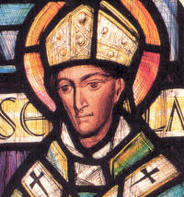 Saint Anselm is a towering figure in monastic, theological and philosophical circles whose works take diligence in getting your mind around. Even centuries later he speaks with precision. Saint Anselm of Canterbury (c. 1033-1109) an Italian by birth, Anselm held various academic and ecclesial titles; he was the archbishop of Canterbury from 1093 until his death in 1109. The Church tells us he is the father of scholasticism and famous for the ontological argument for God's existence. Though never formally canonized --the process was not developed then-- Anselm was acknowledged a saint by Clement XI and named a Doctor of the Church (1 of 33). One point I noticed recently about Saint Anselm and the promotion of truth is this...
Saint Anselm is a towering figure in monastic, theological and philosophical circles whose works take diligence in getting your mind around. Even centuries later he speaks with precision. Saint Anselm of Canterbury (c. 1033-1109) an Italian by birth, Anselm held various academic and ecclesial titles; he was the archbishop of Canterbury from 1093 until his death in 1109. The Church tells us he is the father of scholasticism and famous for the ontological argument for God's existence. Though never formally canonized --the process was not developed then-- Anselm was acknowledged a saint by Clement XI and named a Doctor of the Church (1 of 33). One point I noticed recently about Saint Anselm and the promotion of truth is this...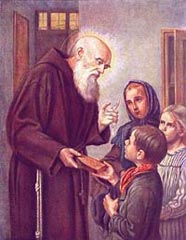 Ask and you shall receive; seek and you shall find; knock and it shall be opened to you, says the Lord, alleluia.
Ask and you shall receive; seek and you shall find; knock and it shall be opened to you, says the Lord, alleluia.I don't typically post the Holy Father's funeral addresses for cardinals here because they'd be too many. But I think this is one is an exceptional circumstance with the death of His Eminence, Tomas Cardinal Spidlik who was laid to rest today. Emphasis added for important points, obviously.
May Cardinal Spidlik's memory be eternal!
Among the last words spoken by the mourned Cardinal Spidlik were these: "I have looked for the face of Jesus during my whole life, and now I am happy and at peace because I am about to see it." This wonderful thought -- so simple, almost childlike in its expression, and yet so profound and true -- refers us immediately to the prayer of Jesus, which resounded a moment ago in the Gospel: "Father, I desire that they also, whom thou hast given me, may be with me where I am, to behold my glory which thou hast given me in thy love for me before the foundation of the world" (John 17:24).
It is beautiful and consoling to meditate on this
correspondence between man's desire, who aspired to see the Lord's face, and
Jesus' own desire. In reality, that of Christ is much more than an aspiration:
It is a will. Jesus says to the Father: "I desire that they also ... may
be where I am." And it is precisely here, in this will, where we find the
"rock," the solid foundation to believe and to hope. The will of
Jesus in fact coincides with that of God the Father, and with the work of the
Holy Spirit it constitutes for man a sort of sure "embrace," strong
and gentle, which leads him to eternal life.
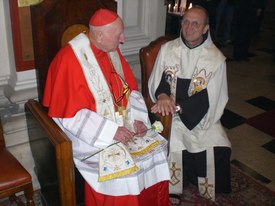
What an immense gift to hear this will of God from his own mouth! I think that the great men of faith live immersed in this grace, they have the gift to perceive this truth with particular force, and so can also go through harsh trials, such as those that Father Tomas Spidlik went through, without losing confidence, and keeping, on the contrary, a lively sense of humor, which is certainly a sign of intelligence but also of interior liberty. Under this profile, evident was the likeness between our mourned cardinal and the Venerable John Paul II: both were given to ingenious joking and jokes, even though having had as youths difficult personal circumstances, similar in some aspects. Providence made them meet and collaborate for the good of the Church, especially so that she would learn to breathe fully "with her two lungs," as the Slav Pope liked to say.
This liberty and presence of spirit has its objective foundation in the Resurrection of Christ. I want to underline it because we are in the Easter liturgical season and because it is suggested by the first and second biblical readings of this celebration. In his first preaching, on the day of Pentecost, St. Peter, full of the Holy Spirit, proclaims the realization in Jesus Christ of Psalm 16.
It is wonderful to see how the Holy Spirit reveals to the Apostles all the beauty of those words in the full interior light of the Resurrection: "I saw the Lord always before me, for he is at my right hand that I may not be shaken; therefore my heart was glad, and my tongue rejoiced; moreover my flesh will dwell in hope" (Acts 2:25-26; cf Psalm 16/15:8-9). This prayer finds superabundant fulfillment when Christ, the Holy One of God, is not abandoned in hell. He in the first place has known "ways of life" and has been filled with joy with the presence of the Father (cf Acts 2:27-28; Psalm 16/15:11).
The hope and joy of the Risen Jesus are also the hope and joy of his friends, thanks to the action of the Holy Spirit. Father Spidlik demonstrated it habitually with his way of living, and this witness of his was ever more eloquent with the passing of the years because, despite his advanced age and the inevitable infirmities, his spirit remained fresh and youthful. What is this if not friendship with the Risen Lord?
In the second reading, St. Peter blesses God that "by his great mercy we have been born anew to a living hope through the resurrection of Jesus Christ from the dead." And he adds: "In this you rejoice, though now for a little while you may have to suffer various trials" (1 Peter 1:3.6). Here, too, is seen clearly how hope and joy are theological realities that emanate from the mystery of the Resurrection of Christ and from the gift of his Spirit. We could say that the Holy Spirit takes them from the heart of the Risen Christ and infuses them in the heart of his friends.
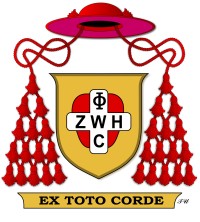
I introduced on purpose the image of the "heart," because, as many of you know, Father Spidlik chose it as the motto of his cardinal's coat of arms: "Ex toto corde," "with all the heart." This expression is found in the Book of Deuteronomy, within the first and fundamental commandment of the law, there where Moses says to the people: "Hear, O Israel: The Lord our God is one Lord; and you shall love the Lord your God with all your heart, and with all your soul, and with all your might" (Deuteronomy 6:4-5). "With all the heart -- ex toto corde" refers hence to the way with which Israel must love its God. Jesus confirms the primacy of this commandment, which he combines with that of love of neighbor, affirming that the latter is "similar" to the first and that from both the whole law and the prophets depend (cf Matthew 22:37-39). Choosing this motto, our venerated brother placed, so to speak, his life within the commandment of love, he inscribed it wholly in the primacy of God and of charity.
There is another aspect, a further meaning of the expression "ex toto corde," that surely Father Spidlik had present and attempted to manifest with his motto. Always starting from the Biblical root, the symbol of the heart represents in Eastern spirituality the seat of prayer, of the meeting between man and God, but also with other men and with the cosmos. And here we must remember that in Cardinal Spidlik's standard, the heart that the coat of arms shows contains a cross in whose arms intersect the words "phos" and "zoe" -- "light" and "life" -- which are names of God. Hence, the man who fully receives, "ex toto corde," the love of God, receives light and life, and becomes in turn light and life in humanity and in the universe.
But who is this man? Who is this "heart" of the
world, if not Jesus Christ? He is the Light and life, for in Him "the
whole fullness of deity dwells bodily" (Colossians 2:0). And I wish to
recall here that our deceased brother was a member of the Society of Jesus,
that is, a spiritual son of St. Ignatius who put in the center of faith and
spirituality the contemplation of God in the mystery of Christ.
In this symbol of the heart East and West meet, not in a devotional but in a profoundly Christological sense, as other Jesuit theologians of the last century revealed. And Christ, central figure of Revelation, is also the formal principle of Christian art, a realm that had in Father Spidlik a great teacher, inspirer of ideas and of expressive projects, which found an important synthesis in the Redemptoris Mater chapel of the Apostolic Palace.
I would like to conclude returning to the theme of the Resurrection, quoting a text much loved by cardinal Spidlik, a fragment of the Hymns on the Resurrection of St. Ephrem the Syrian:
"From on High He descended as Lord,
From the womb he issued as a slave,
Death knelt before Him in Sheol,
And life adored Him in his resurrection.
"Blessed is his victory!" (No. 1:8).
May the Virgin Mother of God accompany the soul of our venerated brother in the embrace of the Most Holy Trinity, where "with all the heart" he will eternally praise his infinite Love. Amen.
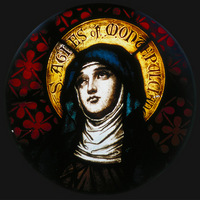 Let hearts rejoice who search for the Lord. Seek the
Lord and you will be strengthened, seek always the face of the Lord.
Let hearts rejoice who search for the Lord. Seek the
Lord and you will be strengthened, seek always the face of the Lord.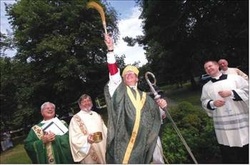 God, eternal shepherd, You tend Your Church in many ways, and rule us with love. Help Your chosen servant William as pastor for Christ, to watch over Your flock. Help him to be a faithful teacher, a wise administrator, and a holy priest.
God, eternal shepherd, You tend Your Church in many ways, and rule us with love. Help Your chosen servant William as pastor for Christ, to watch over Your flock. Help him to be a faithful teacher, a wise administrator, and a holy priest.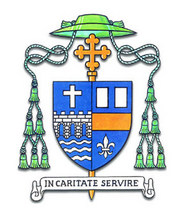
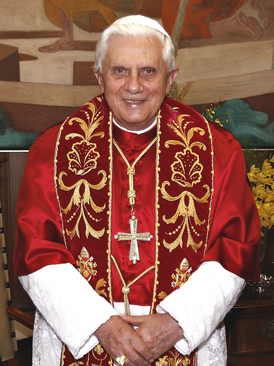 Today is a wonderful day to celebrate: the 5th anniversary of the election of Pope Benedict XVI as the Supreme Pontiff of the Holy Roman Church.
Today is a wonderful day to celebrate: the 5th anniversary of the election of Pope Benedict XVI as the Supreme Pontiff of the Holy Roman Church.
The papacy of Benedict will be marked in history as one that attended to the recovery of the sacred and the beautiful. Recall some of the words he spoke at his inaugural Mass as Pontiff:
"It is really true: as we follow Christ in this mission to be fishers of men, we must bring men and women out of the sea that is salted with so many forms of alienation and onto the land of life, into the light of God. It is really so: the purpose of our lives is to reveal God to men. And only where God is seen does life truly begin. Only when we meet the living God in Christ do we know what life is. We are not some casual and meaningless product of evolution. Each of us is the result of a thought of God. Each of us is willed, each of us is loved, each of us is necessary. There is nothing more beautiful than to be surprised by the Gospel, by the encounter with Christ. There is nothing more beautiful than to know Him and to speak to others of our friendship with Him. The task of the shepherd, the task of the fisher of men, can often seem wearisome. But it is beautiful and wonderful, because it is truly a service to joy, to God's joy which longs to break into the world."
Pope Benedict XVI
Homily at the Mass for the Inauguration of the Pontificate, 2005
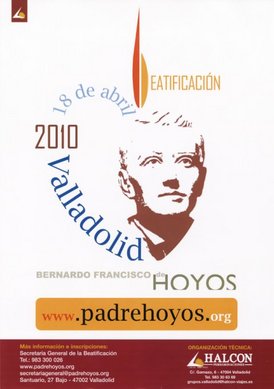
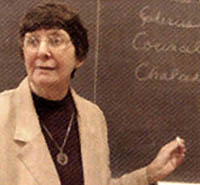 The April 2010 issue of Inside the Vatican (18:4) published a special commemorative issue observing the papal death of John Paul II and the papal election of Benedict XVI. The editor asked various people to write their memories of one of the popes. Sister Sara Butler, MSBT, a professor of dogmatic theology at St Joseph's Seminary -Dunwoodie, New York, offered her thoughts on Pope John Paul's contribution to feminist thinking. Sister Sara is a published author and a member of the Anglican-Roman Catholic Dialogue and the International Theological Commission. Sister remembers:
The April 2010 issue of Inside the Vatican (18:4) published a special commemorative issue observing the papal death of John Paul II and the papal election of Benedict XVI. The editor asked various people to write their memories of one of the popes. Sister Sara Butler, MSBT, a professor of dogmatic theology at St Joseph's Seminary -Dunwoodie, New York, offered her thoughts on Pope John Paul's contribution to feminist thinking. Sister Sara is a published author and a member of the Anglican-Roman Catholic Dialogue and the International Theological Commission. Sister remembers:
Looking back over the papacy of the Servant of God John Paul II, I find myself especially grateful for the initiative he took in addressing the feminist critique. The Pope did this in his Letter to Women (1995), his apostolic letter On the Dignity and Vocation of Women (Mulieris dignitatem, 1988), and his ground-breaking catecheses on the "theology of the body." He not only acknowledged the positive contributions of feminist scholarship and offered needed clarifications and correctives in response to their objections; he also spelled out his own appreciation of the "genius" of women and took steps to promote their increased participation in the Church and in the social order. Since the Pope's death, we are already beginning to see the fruits of his recommendation that Catholic women undertake to develop a "new feminism," consistent with Catholic doctrine (Evangelium vitae, par 99). In my opinion , it is hard to overestimate the contribution Pope John Paul II made to meeting this contemporary challenge.
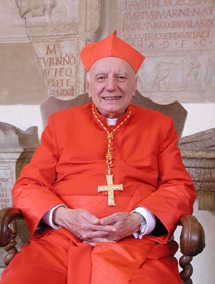 The staff of the Centro Aletti with faith in the life-giving power of the Lord's Resurrection announced the death of Tomáš Cardinal Špidlík Friday, 16 April 2010 at 9 pm.
The staff of the Centro Aletti with faith in the life-giving power of the Lord's Resurrection announced the death of Tomáš Cardinal Špidlík Friday, 16 April 2010 at 9 pm.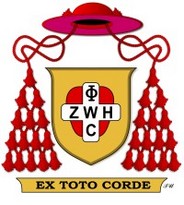
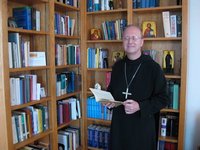 On November 11, 2008, Abbot Gregory Polan of Conception Abbey received the US bishops' positive vote for the liturgical use of the Revised Grail Psalter. The Grail Psalter was first published for liturgical use in 1963 and revised by Abbot Gregory and monks of Conception Abbey according to current translation principles including Liturgiam Authenticam (2001)
On November 11, 2008, Abbot Gregory Polan of Conception Abbey received the US bishops' positive vote for the liturgical use of the Revised Grail Psalter. The Grail Psalter was first published for liturgical use in 1963 and revised by Abbot Gregory and monks of Conception Abbey according to current translation principles including Liturgiam Authenticam (2001)
Recently, the whole project received what is called the "recognitio" from the Congregation for Divine Worship and the Disciple of the Sacraments (the Vatican office deputed by the pope to guide liturgical matters) in a March 19th letter to Bishop Arthur J. Serratelli, Bishop of Paterson and Chairman of the US Bishops' Committee on Divine Worship.
The reception of Vatican approval of these texts means that future liturgical books will use this translation of the Psalms.
Read Conception Abbey's press release on receiving the Vatican recognitio for the Revised Grail Psalter, which gives many of the interesting details of the work.
The Catholic Key Blog ran a story on the matter on Thursday, April 15, 2010.
Ut in omnibus glorificetur Deus, That in all things may God be glorified
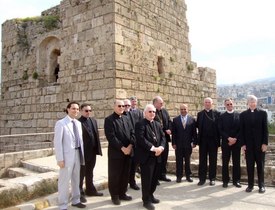 As bishop, I am told, you are asked to sit on boards and be a voice for causes that you may not have too much interest in or knowledge of. While to the new Archbishop Dolan's portfolio as the archbishop of New York, he is the chairman of the board of the Catholic Near East Welfare Association (CNEWA) and is learning lots of new and beautiful things about the Church in other parts of the world. He made a recent trip to the Middle East with members of the governing board which opened his eyes to a new reality of what it is like to be an Eastern Christian. John Cardinal Foley, Grand Master of the Equestrian Order of Holy Sepulchre of Jerusalem accompanied the CNEWA board. The archbishop learned the beautiful horizons of the East and the limits thereof.
As bishop, I am told, you are asked to sit on boards and be a voice for causes that you may not have too much interest in or knowledge of. While to the new Archbishop Dolan's portfolio as the archbishop of New York, he is the chairman of the board of the Catholic Near East Welfare Association (CNEWA) and is learning lots of new and beautiful things about the Church in other parts of the world. He made a recent trip to the Middle East with members of the governing board which opened his eyes to a new reality of what it is like to be an Eastern Christian. John Cardinal Foley, Grand Master of the Equestrian Order of Holy Sepulchre of Jerusalem accompanied the CNEWA board. The archbishop learned the beautiful horizons of the East and the limits thereof.This coming Monday is the fifth anniversary of the election of Pope Benedict XVI. Communion and Liberation is encouraging people to attend Mass, pray a Rosary, or attend Eucharistic Adoration on that day to pray for the Holy Father, in thanksgiving for his witness to Christ.
The following letter is from Father Julián Carrón, the President of Communion and Liberation, sent to the Italian newspaper La Repubblica (April 4, 2010).
Let Us Return, Wounded, to Christ
Father Julián Carrón
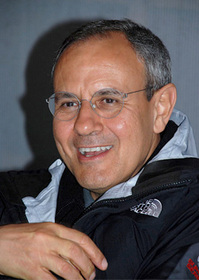
None of us has ever been as dismayed as we are in front of the heart-wrenching story of child abuse. Our dismay arises from our inability to respond to the demand for justice which springs from the bottom of our hearts.+The request to assume responsibility, the acknowledgement of the evil committed, the reprimand for the mistakes made in the handling of the affair - all of this seems to us to be totally inadequate as we face this sea of evil. Nothing seems to be enough. And so we can understand the frustrated reactions that have been coming forth at this time.
This has all served the purpose of making us stand face to face with our demand for justice, acknowledging that it is limitless, bottomless - as deep as the wound itself. Since it is infinite, it can never be satisfied. So the dissatisfaction, impatience and even the disillusionment of the victims are understandable, even after all the injuries and mistakes have been admitted: nothing can satisfy their thirst for justice. It's like entering into an endless struggle. From this point of view, the ones who committed the abuse are paradoxically facing a challenge similar to that of the victims: nothing can repair the damage that has been done. This in no way means that their responsibility can be lifted, and much less the verdict that justice may impose upon them; it would not be enough even if they were to serve the maximum sentence.
If this is the case, then the most burning question, which no one can escape, is as simple as it is unavoidable: "Quid animo satis?" What can satisfy our thirst for justice? This is where we begin to feel all our powerlessness, so powerfully expressed in Ibsen's Brand: "Answer me, God, in the jaws of death: Is there no salvation for the Will of Man? No small measure of salvation?" In other words, cannot the whole force of human will succeed in bringing about the justice that we so long for?
This is why even those who demand it most, those who are most insistent in calling for justice, will not be loyal to the depth of their nature with its demand for justice if they do not face this incapacity that they share with all men. Were we not to face it, we would fall prey to an even crueler injustice, to a veritable assassination of our humanity, because in order to keep on crying out for the justice that we formulate according to our own measurement, we have to silence the voice of our hearts, thus forgetting the victims and abandoning them in their struggle.
It is the Pope who, paradoxically, in his disarming boldness, has not fallen prey to reducing justice to any sort of human measure. To begin with, he admitted without hesitation the gravity of the evil committed by priests and religious, urged them to accept their responsibility for it, and condemned the way certain bishops in their fear of scandal have handled the affair, expressing his deep dismay over what had happened and taking steps to ensure that it not happen again. But then, he expressed his full awareness that this is not enough to respond to the demand that there be justice for the harm inflicted: "I know that nothing can undo the wrong you have endured. Your trust has been betrayed and your dignity has been violated." Likewise, even if the perpetrators serve their sentences, repent, and do penance, it will never be enough to repair the damage they did to the victims and to themselves.
Benedict XVI's recognition of the true nature of our need, of our struggle, is the only way to save our full demand for justice; it is the only way to take it seriously, to take it fully into consideration. "The demand for justice is a need that is proper to man, proper to a person. Without the possibility of something beyond, of an answer that lies beyond the existential modalities that we can experience, justice is impossible... If the hypothesis of a 'beyond' were eliminated, that demand would be unnaturally suffocated" (Father Giussani).
So how did the Pope save this demand? By calling on the only one who can save it, someone who makes the beyond present in the here and now, namely, Christ, the Mystery made flesh. "Jesus Christ ... was Himself a victim of injustice and sin. Like you, He still bears the wounds of His own unjust suffering. He understands the depths of your pain and its enduring effect upon your lives and your relationships, including your relationship with the Church."
Calling on Christ is not a way to seek a hiding place to run off to in the face of the demand for justice: it is the only way to bring justice about. The Pope calls upon Christ, and steers clear of a truly dangerous shoal, that of distancing Christ from the Church, as if the Church were too full of filth to be able to bear Him. The Protestant temptation is always lurking. It would have been very easy to give in to, but at too high a price - that of losing Christ. Because, as the Pope recalls, "it is in the communion of the Church that we encounter the person of Jesus Christ." And so, aware of the difficulty both the victims and the guilty have "to forgive or be reconciled with the Church," he dares to pray that, by drawing near to Christ and sharing in the life of the Church, they "will come to rediscover Christ's infinite love for each one of you," since He is the only one able to heal their wounds and rebuild their lives.
This is the challenge facing all of us who are incapable of finding an answer for our sins and for the sins of others: agreeing to take part in Easter, which we celebrate during these days, as the only way to see the re-blossoming of hope.
Having another perspective is always helpful. Excerpts of an article written by non-Catholic Sam Miller - a prominent Cleveland Jewish businessman: "Why would newspapers carry on a vendetta on one of the most important institutions that we have today in the United States, namely the Catholic Church?
Do you know - the Catholic Church educates 2.6 million students everyday at the cost to that Church of 10 billion dollars, and a savings on the other hand to the American taxpayer of 18 billion dollars. The graduates go on to graduate studies at the rate of 92%.
The Church has 230 colleges and universities in the U.S. with an enrollment of 700,000 students.
The Catholic Church has a non-profit hospital system of 637 hospitals, which account for hospital treatment of 1 out of every 5 people - not just Catholics - in the United States today.
But the press is vindictive and trying to totally denigrate in every way the Catholic Church in this country. They have blamed the disease of pedophilia on the Catholic Church, which is as irresponsible as blaming adultery on the institution of marriage.
Let me give you some figures that Catholics should know and remember. For example, 12% of the 300 Protestant clergy surveyed admitted to sexual intercourse with a parishioner; 38% acknowledged other inappropriate sexual contact in a study by the United Methodist Church, 41.8% of clergy women reported unwanted sexual behavior; 17% of laywomen have been sexually harassed.
Meanwhile, 1.7% of the Catholic clergy has been found guilty of pedophilia. 10% of the Protestant ministers have been found guilty of pedophilia. This is not a Catholic problem.
A study of American priests showed that most are happy in the priesthood and find it even better than they had expected, and that most, if given the choice, would choose to be priests again in face of all this obnoxious PR the church has been receiving.
The Catholic Church is bleeding from self-inflicted wounds. The agony that Catholics have felt and suffered is not necessarily the fault of the Church. You have been hurt by a small number of wayward priests that have probably been totally weeded out by now.
Walk with your shoulders high and you head higher. Be a proud member of the most important non-governmental agency in the United States. Then remember what Jeremiah said: 'Stand by the roads, and look and ask for the ancient paths, where the good way is and walk in it, and find rest for your souls'. Be proud to speak up for your faith with pride and reverence and learn what your Church does for all other religions. Be proud that you're a Catholic."
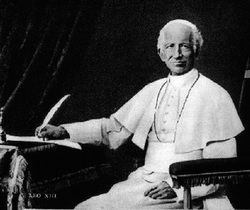 Pope Leo XIII begins Humanum Genus (the 1884 encyclical
on Freemasonry) by acknowledging the divided heart of humanity since the Fall
man and woman: there are "separated into two diverse and opposite parts, of
which the one steadfastly contends for truth and virtue, the other of those
things which are contrary to virtue and to truth. The one is the kingdom of God
on earth, namely, the true Church of Jesus Christ; and those who desire from
their heart to be united with it, so as to gain salvation, must of necessity
serve God and His only-begotten Son with their whole mind and with an entire
will. The other is the kingdom of Satan, in whose possession and control are
all whosoever follow the fatal example of their leader and of our first
parents, those who refuse to obey the divine and eternal law, and who have many
aims of their own in contempt of God, and many aims also against God."
Pope Leo XIII begins Humanum Genus (the 1884 encyclical
on Freemasonry) by acknowledging the divided heart of humanity since the Fall
man and woman: there are "separated into two diverse and opposite parts, of
which the one steadfastly contends for truth and virtue, the other of those
things which are contrary to virtue and to truth. The one is the kingdom of God
on earth, namely, the true Church of Jesus Christ; and those who desire from
their heart to be united with it, so as to gain salvation, must of necessity
serve God and His only-begotten Son with their whole mind and with an entire
will. The other is the kingdom of Satan, in whose possession and control are
all whosoever follow the fatal example of their leader and of our first
parents, those who refuse to obey the divine and eternal law, and who have many
aims of their own in contempt of God, and many aims also against God."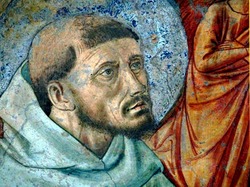
The authority of sacred Scripture should be authoritative enough, but in case Scripture fails your logic, the Church also says that Truth is identified and lived through and with sacred Tradition and the Magisterium. More clearly: the believing Catholic holds that Truth is revealed in three inter-related pillars: sacred Scripture, Tradition and the Magisterium. One can't have one of the pillars without the others. To do so would mean that you are Protestant.
Concerning many in the Church (catechist, laity and ordained) is the lack of understanding of who Jesus is, and His place in our lives today. Many Catholics are functional agnostics; they have no concept of who Jesus is, why He is important, and what he has to do with the Church. No surprise to me since I contend that many of the ordained can't adequately explain matters of Christology or Sotierology (the study of Chist and the study of salvation respectively) as is evidence in their praying the Mass, preaching, their practice of the sacraments in their own lives, and their teaching in other venues. I would also contend that many of the ecclesial problems we face today are the direct result of not really knowing who Jesus is, and how to conform ourselves to His Way. The Pslams, as one example, tell us to seek the face of the Lord (the Christian would understand this to mean, seek the face of Christ). As one consequence of not knowing Jesus is the denial that we are already saved --that salvation has already happened, that the hundredfold promised by the Lord is already fulfilled. Do you know that you are saved? Do act as though you are saved or are still persisting in your sinful ways?
In the recent English edition of the L'Osservatore Romano (7 April 2010), Lucetta Scardaffia's article "The Shroud and secularization" makes a few good points to think about when asking the questions about who Jesus is and what we face today:
"It seems incredible, but many young people do not even know that Jesus existed historically: in various countries, including Italy, today the history of Christianity no longer forms part of the school curriculum, and this leads to an ignorance that is also the result of tendencies geared to make Christianity a religion like others, with no specificity, hence leading to considering Christ as a mythical being, almost as if he were a Greek, Roman or Orienal divinity.
In international milieus -- even in organizations such as the United Nations-- propaganda for a mistaken concept of multiculturalism has been spreading for decades: this is proposed as a panacea for every conflict, providing that all religions be considered absolutely equal, in other words that each waives all claim to truth.
Remembering that Christianity is born from the existence in history of a man, Jesus, who said he was the Son of God, is an obstacle to the seemingly irenic fabrication because it highlights the difference of Christianity in comparison with other religions. A God who becomes incarnate to save human beings, in fact is an absolute unicum [absolutely unique], difficult to standardize.
...
The history of the birth of the individual is also interwoven with the history of the theological and sacramental significance of the Body of Christ --with the history of the sacrifice of the altar, for which the Body becomes a monstrance.
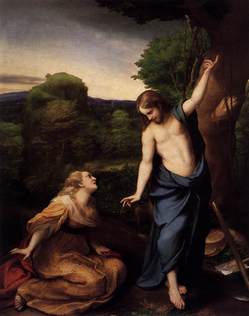
She is easily seen by those who love her and she is found by those who seek her. She anticipates those who desire her and shows herself to them first. He who, as soon as it is light keeps watch for her will not have to toil, for he will find her seated at his doors. (Wis. 6:13ff)
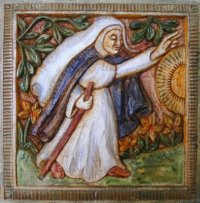 Compassionate God, you gave your divine light to
Blessed Margaret who was blind from birth, that with the eye of her heart she
might contemplate you alone. Be the light of our eyes that we may turn from
what is evil and reach the home of never-ending light.
Compassionate God, you gave your divine light to
Blessed Margaret who was blind from birth, that with the eye of her heart she
might contemplate you alone. Be the light of our eyes that we may turn from
what is evil and reach the home of never-ending light.
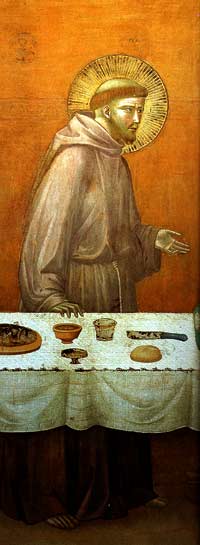
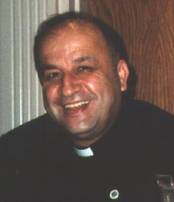 The Holy Father consented to the election of Chor-bishop Yousif (Joseph) Habash, pastor of the Church of the Sacred Heart of Jesus (Los Angeles) as 2nd bishop of the Eparchy of Our Lady of Deliverance (Newark) by the Patriarch and bishops of the Syrian Catholic Church.
The Holy Father consented to the election of Chor-bishop Yousif (Joseph) Habash, pastor of the Church of the Sacred Heart of Jesus (Los Angeles) as 2nd bishop of the Eparchy of Our Lady of Deliverance (Newark) by the Patriarch and bishops of the Syrian Catholic Church.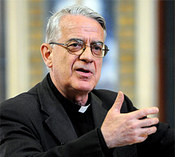
This past Friday (April 9) Jesuit Father Federico Lombardi, director of the Vatican press office, spoke about the sexual abuse of minors. Remembering that Father Lombardi is only the press director for the Vatican and not someone who sets policy, this statement fine. It evokes some questions and it opens conversation, in my opinion. I think it is necessary to read the address in its entirety because there are a number of points made therein that were not mentioned --no surprise-- in the secular media. This is his statement as published by Vatican Radio.
The debate concerning sexual abuse, and not only that committed by the
clergy, continues with news items and comments of various kinds. How can we
sail through these stormy waters while maintaining a secure course and
responding to the evangelical motto 'Duc in altum' -- Put out into the deep?
In the first place, by continuing to seek truth, and peace for the victims. One of the most striking things is that today so many inner wounds are coming to light, wounds that also date to many years (sometimes decades) ago, but evidently still open. Many victims do not seek financial compensation but inner assistance, a judgment on their painful individual experiences. There is something that we have yet to fully understand; perhaps we need a more profound experience of events that have had such a negative impact on the lives of individuals, of the Church and of society. One example of this, at the collective level, is the hatred and violence of conflicts between peoples which are, as we see, so difficult to overcome in true reconciliation. Abuse opens wounds at a deep inner level. For this reason, certain episcopates were right when they courageously resumed developing ways and places in which victims could express themselves freely, listening to them without taking it for granted that the problem had already been faced and overcome by the workshops established sometime ago. For this reason also, other episcopates and individual bishops were right to intervene paternally, showing spiritual, liturgical and human concern for victims. It seems certain that the number of new accusations of abuse is falling, as is happening in the United States, but for many people the road to profound healing is only now beginning, and for others it has yet to start. In the context of this concern for victims, the Pope has written of his readiness to hold new meetings with then, thus sharing in the journey of the entire ecclesial community. But this journey, in order to achieve profound effects, must take place in respect for people and the search for peace.
Alongside concern for victims we must continue to implement, decisively and truthfully, the correct procedures for the canonical judgment of the guilty, and for collaborating with the civil authorities in matters concerning their judicial and penal competencies, taking the specific norms and situations of the various countries into account. Only in this way can we hope effectively to rebuild a climate of justice and complete trust in the ecclesiastical institution. It has happened that a number of leaders of communities and institutions, through inexperience or unpreparedness, have not had a ready understanding of the protocols and criteria for intervention which could have helped them intervene decisively even when this was very difficult or painful for them, also because they were often surprised by the accusations. But, while civil law intervenes through general norms, canon law must take account of the specific moral gravity of an abuse of the trust placed in persons who hold positions of responsibility within the ecclesial community, and of the flagrant contradiction with the conduct they should show. In this sense, transparency and rigour are urgent requirements if the Church is to bear witness to wise and just government.
The formation and selection of candidates for the priesthood, and more generally of the staff of educational and pastoral institutions, is the basis for an effective prevention of the risk of future abuses. Achieving a healthy maturity of the personality, also from a sexual point of view, has always been a difficult challenge, but today it is particularly so, although the best psychological and medical knowledge is of great help in spiritual and moral formation. It has been observed that the greatest frequency of abuses coincided with the most intense period of the 'sexual revolution' of past decades. Formation must take account of this context and of the more general context of secularisation. In the final analysis, this means rediscovering and reaffirming the sense and importance of sexuality, chastity and emotional relationships in today's world, and doing so in concrete, not just verbal or abstract, terms. What a source of disorder and suffering their violation or undervaluation can be! As the Pope observed in his Letter to Irish Catholics, a Christian priestly life today can respond to the requirements of its vocation only by truly nourishing itself at the wellspring of faith and friendship with Christ.
People who love truth and the objective evaluation of problems will know where to seek and find information for a more overall comprehension of the problem of paedophilia and the sexual abuse of minors in our time, in different countries, understanding its range and pervasiveness. Thus they will be able to achieve a better understanding of the degree to which the Catholic Church shares problems that are not only her own, to what extent they have particular gravity for her and require specific interventions, and, finally, the extent to which the experience the Church is going through in this field may also be useful for other institutions or for society as a whole. In this context, we truly feel that the communications media have not yet worked sufficiently, especially in countries in which the Church has a stronger presence and in which she is more easily subject to criticism. Yet, documents such as the national U.S. report on the mistreatment of children deserve to be better known in order to understand what fields require urgent social intervention, and the proportions of the problem. In the U.S.A. in 2008 alone, 62,000 people were identified as having committed acts of abuse against minors, while the proportion of Catholic priests was so small as not to be taken into consideration as a group.
The protection of minors and young people is, then, an immense and unlimited field, which goes well beyond the specific problem concerning certain members of the clergy. People who sensitively, generously and attentively dedicate their efforts to this problem deserve gratitude, respect and encouragement from everyone, especially from the ecclesial and civil authorities. Theirs is an essential contribution for the serenity and credibility of the education and formation of young people, both inside and outside the Church. The Pope rightly expressed words of great appreciation for them in his Letter to Irish Catholics, though naturally with a view to a vaster horizon.
Finally, Pope Benedict XVI, a coherent guide along the path of rigour and truth, merits all respect and support, testimony of which is reaching him from all parts of the Church. He is a pastor well capable of facing -- with great rectitude and confidence -- this difficult time in which there is no lack of criticism and unfounded insinuations. It must be said that he is a Pope who has spoken a lot about the Truth of God and about respect for truth; and he has become a credible witness of this. We accompany him, learning from him the constancy necessary to grow in truth and transparency, continuing to open our horizons to the serious problems of the world and responding patiently to the slow and gradual release of partial or presumed 'revelations' which seek to undermine his credibility, and that of other institutions or individuals of the Church.
This patient and solid love of truth
is necessary, in the Church, in the society in which we live, in communicating
and in writing, if we wish to serve rather than confuse our fellow men and
women.
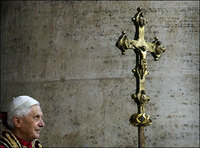 The Knights of Columbus has begun a novena of prayer for Pope Benedict XVI beginning today, Divine Mercy Sunday, April 11, and ending on Monday, April 19, the anniversary of election as Supreme Pontiff. 2010 is the 5th anniversary of the Pope's election.
The Knights of Columbus has begun a novena of prayer for Pope Benedict XVI beginning today, Divine Mercy Sunday, April 11, and ending on Monday, April 19, the anniversary of election as Supreme Pontiff. 2010 is the 5th anniversary of the Pope's election. In every age the Lord wants his mercy to be known to us. Over time you have no doubt noticed the Lord revealing Himself through the works of various saints: Saints Gertrude, Mechtilde, Margaret Mary Alocoque, Claude la Colmbiere, Fautina, and Blessed Francisco de los Hoyos. Most often the call to recognize divine Mercy has come in the devotion to the Sacred Heart of Jesus which we ordinarily devote the month of June to. Today is the fruit of Saint Faustina's mission to make known Jesus' invitation to enter into His heart.
In every age the Lord wants his mercy to be known to us. Over time you have no doubt noticed the Lord revealing Himself through the works of various saints: Saints Gertrude, Mechtilde, Margaret Mary Alocoque, Claude la Colmbiere, Fautina, and Blessed Francisco de los Hoyos. Most often the call to recognize divine Mercy has come in the devotion to the Sacred Heart of Jesus which we ordinarily devote the month of June to. Today is the fruit of Saint Faustina's mission to make known Jesus' invitation to enter into His heart.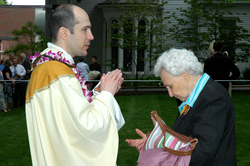 O my Jesus, I beg you on behalf of the whole Church:
Grant it love and the light of the your Spirit, and give power to the words of
priests so that hardened hearts might be brought to repentance and return to
you, O Lord.
O my Jesus, I beg you on behalf of the whole Church:
Grant it love and the light of the your Spirit, and give power to the words of
priests so that hardened hearts might be brought to repentance and return to
you, O Lord.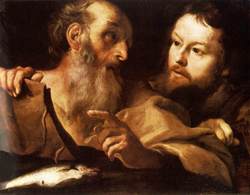
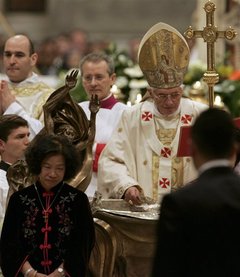 These are the
lambs, newly-baptized,
These are the
lambs, newly-baptized,
who proclaimed the glad tidings: Alleluia! recently come to the waters, and full of God's light and splendor. Alleluia! Alleluia!
Lady, Queen, whom grace from heaven, Has preferred to all on earth, Now renewed, the world is brightened, By your holy virgin-birth.
Oh, how lovely and how wondrous, Is the cure that saved us all: Jesus, in His love, becomes now, Victim for His people's fall!
Now renewed through holy washing, In the font of our rebirth, Soon the chrism's oil and fragrance, Will give strength to us on earth!
To each Christian now is given, Christ's own Flesh as Bread of Life. Christ's own Blood becomes the sweetest, Source of joy in all our strife!
Easter week brings so many joys, graces and consolations. One such joy, grace and consolation that I've been thinking and praying about all week during Mass and praying the Divine Office, is the is new life in Christ that those received into the Church at the Easter Vigil and on Easter Sunday. The gift of salvation given to us is has once again been given to other called not by human concern but by the Holy Spirit. The Neophytes --the newly-initiated Christians who were baptized and confirmed and communicated-- live differently now that the doors of our God-given destiny has been received. Musically we can think of the chant text given above, "Isti sunt Agni novelli," taken from the Cistercian collection Laudes Vespertine (Westmalle, Belgium, 1939) which gives a keen insight into this beautiful mystery of faith. May Christ shower His blessing on all of us!
 The MedConference is a three-day medical conference
open to physicians, nurses and students of medical and nursing schools.
The MedConference is a three-day medical conference
open to physicians, nurses and students of medical and nursing schools.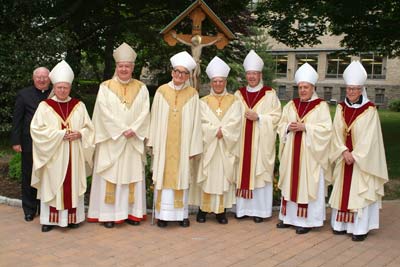 A generation of big names in "East coast Catholicism" in the past two years have died, and Right Reverend Father Gabriel Gibbs is numbered among them. Abbot Gabriel, 84, was the first abbot of Saint Benedict's Abbey, Still River, MA.
A generation of big names in "East coast Catholicism" in the past two years have died, and Right Reverend Father Gabriel Gibbs is numbered among them. Abbot Gabriel, 84, was the first abbot of Saint Benedict's Abbey, Still River, MA.After your descent into Hades, O Christ, and your Resurrection from the dead, the disciples grieved over your departure. They returned to their occupations and attended to their nets and their boats; but their fishing was in vain. You appeared to them since you are the Lord of all; you commanded them to cast their nets on the right side. Immediately your word became deed. They caught a great number of fish, and they found an unexpected meal prepared for them on the shore; which they immediately ate. Now, make us worthy to enjoy this meal with them in a spiritual manner, O Lord and Lover of us all!
The poetic text above draws our attention to the fact that for the believer, that is, the person who is aware of his or her humanity and spiritual need, Christ is the answer ...
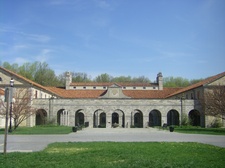 Easter week is time for spring break this year, especially after a very busy Holy Week schedule. And getting away from the ordinary was required. Like all graduate students on break, I went to visit friends at a Conventual Franciscan friary in Maryland.
Easter week is time for spring break this year, especially after a very busy Holy Week schedule. And getting away from the ordinary was required. Like all graduate students on break, I went to visit friends at a Conventual Franciscan friary in Maryland.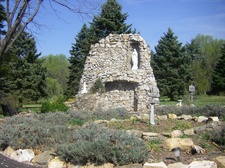
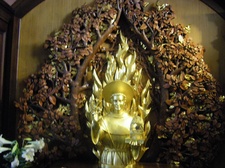
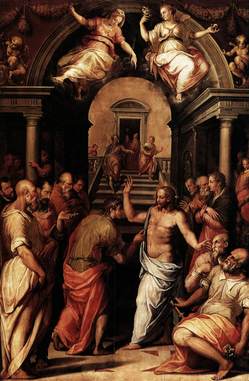 Looking at Luke 24:38ff Christ says, "Why are you troubled, and doubts arise in your heart? Look at my hands and my feet, touch and see."
Looking at Luke 24:38ff Christ says, "Why are you troubled, and doubts arise in your heart? Look at my hands and my feet, touch and see."
Commenting on appearance of Christ in His glorified body, Saint Augustine of Hippo in Sermon 246 tells us that Christ wanted to offer evidence of His resurrection from the dead as a reality! "Was He perhaps already ascended to the Father when He said: 'Touch me and see'? He let His disciples touch Him, indeed, not only touch but feel, to provide a foundation for faith in the reality of His flesh, in reality of His body [ut fides fiat verae carnis veri corporis]. The well-foundedness of the reality had to be made obvious also through human touch [ut exhibibeatur etiam tactibus humanis solidatus veritatis]. Thus He let Himself be touched by the disciples."
Later on Augustine asks about the women who were asked by the Lord not to touch Him because He had yet made the ascension, "What is this inconsistency? The men could not tocuh Him if not here on earth, while the women would be able to touch Him once He ascended to heaven? But what does touching mean if not believing? By faith we touch Christ. And it is better not to touch Him with faith than feel with the hand and not touch Him with faith."
Augustine points us to the proof Christ offers: faith. "The scar of the wound on His flesh served to heal the wound of disbelief." The Lord wanted to cure those who disbelieved.
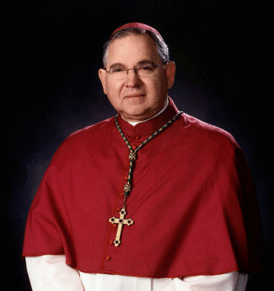 Joyful noise was made upon hearing the appointment of San Antonio's archbishop, José Horacio Gomez, S.T.D., 58, as the next archbishop of Los Angeles (the 5th).
Joyful noise was made upon hearing the appointment of San Antonio's archbishop, José Horacio Gomez, S.T.D., 58, as the next archbishop of Los Angeles (the 5th).
The spin doctors (Peters and Palmo) are rejoicing in their common prediction that His Excellency would be chosen by the Holy Father to pastorally lead the Los Angeles Catholics but most of reasonable sense could have predicted this gesture. Of course we know that they have the pulse on the Church in America!
Archbishop Gomez is the first Mexican-American to lead an archdiocese in the USA and he's also the first member of the Prelature of the Holy Cross (Opus Dei) to do so.
Archbishop Gomez faces a sizeable challenge as the new shepherd of LA: 5 million Catholics (of 11 million people) in 3 counties (87,000 sq miles), 288 parishes in 120 cities, 224 grammar schools, 50 high schools. 70% of the Catholics are Latino.
Thanks be to God for Archbishop Gomez's positive response to the Lord's call to serve in this way.
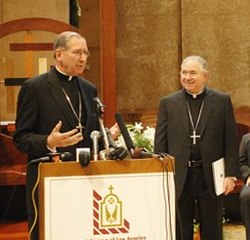 Take a look at some of Archbishop Gomez's writings:
Take a look at some of Archbishop Gomez's writings:
The Encounter with Jesus Christ and the New Evangelization of American Culture (2007)
Disciples and Teachers of the Word: Living the Gospel Message of Reconciliation (2007)
Immigration in 21st-Century America: Its Root Causes and the Obligations of Catholic Social Teaching (2008)
To Seek God in the Spirit of Truth (2008)
La predicación y la enseñanza: Evangelization, Education, and the Hispanic Catholic Future (2009)
Men of Brave Heart: The Virtue of Courage in the Priestly Life (OSV, 2009)
The picture one is getting in the press today of Pope Benedict is that of an out-of-touch old man in 3000 miles away. Somehow from what is commonly known and personally experienced of Benedict XVI, I don't quite think the editors of the NY Times and other press agencies have it right, much less some scheming lawyers trying to make as much money off the sexual abuse crisis. I sometimes wonder if the newspapers and legal profession comprehend reality as it is presented or if fiction is the only genre worth digesting in their diets.
Bishop William Lori offers another view of the Pope, and he outlines some interesting facts of the clergy sex abuse industry and what the Church actually did in an article titled, "The Holy Father I Know."
Some say that on Holy Saturday Jesus went to hell in triumph, to free the souls long imprisoned there. Others say he descended into a death deeper than death, to embrace in his love even the damned. We do not know. Scripture, tradition and pious writings provide hints and speculations, but about this most silent day it is perhaps best to observe the silence. One day I expect he will tell us all about it. When we are able to understand what we cannot now even understand why we cannot understand. Meanwhile, if we keep very still, there steals upon the silence a song of Easter that was always there. On the long mourners' bench of the eternal pity, we raise our heads, blink away our tears and exchange looks that dare to question, 'Could it be?' But of course. That is what it was about. That is what it is all about. O felix culpa!
O happy fault, O necessary sin of Adam,
Which gained for us so great a Redeemer!
To prodigal children lost in a distant land, to disciples who forsook him and fled, to a thief who believed or maybe took pity and pretended to believe, to those who did not know that what they did they did to God, to the whole bedraggled company of humankind he had abandoned heaven to join, he (Jesus) says: 'Come. Everything is ready now. In your fears and your laughter, in your friendships and farewells, in your loves and losses, in what you have been able to do and in what you know you will never get done, come, follow me. We are going home to the waiting Father.'"
Father Richard John Neuhaus
Death on a Friday Afternoon
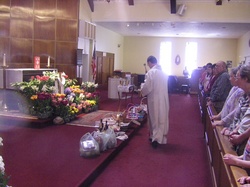
A very long-standing custom in the Church is the blessing of the Easter basket of food stemming from the Lenten observance of fasting from meat, dairy and eggs and other food associated with these items. Still today, we fast from meat on Fridays in Lent and frequently you'll encounter some observing a special fast during the sacred Three Days of Holy Thursday, Good Friday and Holy Saturday. The Church filled with joy at the announcement of Christ's Resurrection from the dead brings with a new joy to our hearts, minds and bodies. As an old Slovenian saying goes, a blessing comes through the stomach! Today, Father Milan blessed the Easter food of Saint Rose of Lima Church (Newtown, CT).
The Order of Blessing of Easter Food
All make the sign of the cross
Priest/Deacon: For our sake Christ became obedient, accepting even death, death on a cross. Therefore God raised him on high and gave him the name above all other names. Blessed be God for ever.
R. Blessed be God for ever.
Priest/Deacon: Throughout Lent we have been preparing for the resurrection of the Lord by prayer, almsgiving, and fasting. Our Lenten fasting is a reminder of our hunger and thirst for holiness which is satisfied only by Christ who feeds and nourishes us by His word and sacraments. When we gather at our first meal of Easter may this food be a sign for us of that heavenly banquet to which the Lord calls us.
Read Deuteronomy 16:1-8 or John 6:1-14 and Psalm 104:1-2, 5-6,10,12-4,24,35.
Intercessions
The Son of God who invites us to the Paschal feast stands ready to help. Let us call upon Him in our need.
R. Lord, prepare us for the feast of life.
That Easter may find us cleansed of sin and ready to live anew our Christian faith, we pray to the Lord. R.
That the bread we share may be a reminder of the Bread of Life we share in the Eucharist, we pray to the Lord. R.
That we may be ready to give from our table to those who hunger and thirst, we pray to the Lord. R.
That we may one day enjoy the banquet of the Lord in the heavenly Kingdom, we pray to the Lord. R.
Priest/Deacon: Christ taught us to pray for our daily bread and so we dare to say:
Our Father...
Prayer of Blessing
God of glory, the eyes of all turn to You as we celebrate Christ's victory over sin and death. Bless us and this food of our first Easter meal. May we who gather at the Lord's table continue to celebrate the joy of his resurrection and be admitted finally to His heavenly banquet. Grant this through Christ our Lord.
R. Amen.
May Christ always nourish you and strengthen you in faith and love, now and for ever.
R. Amen.
And may almighty God bless you all, the Father, and the Son, + and the Holy Spirit.
R. Amen.
The priest sprinkles the food and the people with holy water.
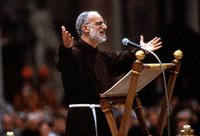 The official preacher to the pope, but not an official of the Holy See, Capuchin Father Raniero Cantalamessa, preached this homily to the Holy Father (and thus to the world) at the Good Friday Service. The preacher's has received much criticism --VERY unfairly in my opinion if you read what he said-- from the secular world, from Catholics who live on the margins of the Faith and others like the Jews for the points of comparisons made therein. It is not a perfect text and nor is it prudent in some places, but it needs to be engaged with faith and reason and not broken into pieces and read out of context. Read the text!!! The problem is that the sound bites we receive from the media become the only criteria of assessing whether something is good, worthy or acceptable for consumption whereas reason would want to hear the whole thing, even to re-read what was said before making foolish comments. Does the imperfect always mean bad? Father Cantalmessa is an evocative and provocative thinker and preacher. I think he deserves a fair hearing without the spin given in the media.
The official preacher to the pope, but not an official of the Holy See, Capuchin Father Raniero Cantalamessa, preached this homily to the Holy Father (and thus to the world) at the Good Friday Service. The preacher's has received much criticism --VERY unfairly in my opinion if you read what he said-- from the secular world, from Catholics who live on the margins of the Faith and others like the Jews for the points of comparisons made therein. It is not a perfect text and nor is it prudent in some places, but it needs to be engaged with faith and reason and not broken into pieces and read out of context. Read the text!!! The problem is that the sound bites we receive from the media become the only criteria of assessing whether something is good, worthy or acceptable for consumption whereas reason would want to hear the whole thing, even to re-read what was said before making foolish comments. Does the imperfect always mean bad? Father Cantalmessa is an evocative and provocative thinker and preacher. I think he deserves a fair hearing without the spin given in the media.
Father Raniero's homily can be read here Good Friday homily 2010.pdf.
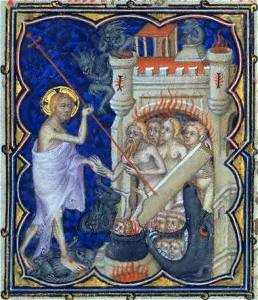 On Great and Holy Saturday the Church contemplates the mystery of the Lord's descent into Hades, the place of the dead. Death, our ultimate enemy, is defeated from within. "He (Christ) gave Himself as a ransom to death in which we were held captive, sold under sin. Descending into Hades through the Cross ... He loosed the bonds of death" (Liturgy of Saint Basil).
On Great and Holy Saturday the Church contemplates the mystery of the Lord's descent into Hades, the place of the dead. Death, our ultimate enemy, is defeated from within. "He (Christ) gave Himself as a ransom to death in which we were held captive, sold under sin. Descending into Hades through the Cross ... He loosed the bonds of death" (Liturgy of Saint Basil).
From an ancient homily for Holy Saturday
Something strange is happening---
there is a great silence on earth today,
a great silence and stillness.
The whole earth keeps silence because the King is asleep.
The earth trembled and is still
because God has fallen asleep in the flesh
and He has raised up all who have slept
ever since the world began.
God has died in the flesh, and hell trembles with fear.
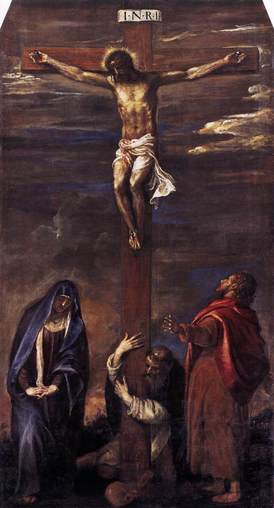 For our sake he was crucified! Jesus, at his death, embraced the tragic experience of death as it had been fashioned by our sins; yet, in his death, Jesus filled death itself with Love, he filled it with the presence of God. By Christ's death, death itself was vanquished, for he filled death with the one power capable of cancelling the sin that had spawned it: Jesus filled death with Love!
For our sake he was crucified! Jesus, at his death, embraced the tragic experience of death as it had been fashioned by our sins; yet, in his death, Jesus filled death itself with Love, he filled it with the presence of God. By Christ's death, death itself was vanquished, for he filled death with the one power capable of cancelling the sin that had spawned it: Jesus filled death with Love!
Through faith and Baptism, we have access to the death of Christ, to the mystery of the Love by which Christ himself tasted and conquered death ... and this in turn becomes the first step of our journey back to God, a journey which will end at the moment of our own death, a death experienced in Christ and with Christ: in Love!
~Archbishop Angelo Comastri
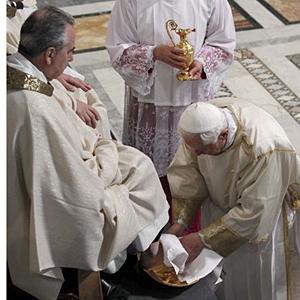 "...God has shown himself, because he, infinite and beyond the grasp of our reason, is the God who is close to us, who loves us, and whom we can know and love.
"...God has shown himself, because he, infinite and beyond the grasp of our reason, is the God who is close to us, who loves us, and whom we can know and love.
Jesus prays for the Church to be one and apostolic. This prayer, then, is properly speaking an act which founds the Church. The Lord prays to the Father for the Church. She is born of the prayer of Jesus and through the preaching of the Apostles, who make known God's name and introduce men and women into the fellowship of love with God. Jesus thus prays that the preaching of the disciples will continue for all time, that it will gather together men and women who know God and the one he has sent, his Son Jesus Christ. He prays that men and women may be led to faith and, through faith, to love. He asks the Father that these believers "be in us" (v. 21); that they will live, in other words, in interior communion with God and Jesus Christ, and that this inward being in communion with God may give rise to visible unity. Twice the Lord says that this unity should make the world believe in the mission of Jesus. It must thus be a unity which can be seen - a unity which so transcends ordinary human possibilities as to become a sign before the world and to authenticate the mission of Jesus Christ. Jesus' prayer gives us the assurance that the preaching of the Apostles will never fail throughout history; that it will always awaken faith and gather men and women into unity - into a unity which becomes a testimony to the mission of Jesus Christ. But this prayer also challenges us to a constant examination of conscience. At this hour the Lord is asking us: are you living, through faith, in fellowship with me and thus in fellowship with God? Or are you rather living for yourself, and thus apart from faith? And are you not thus guilty of the inconsistency which obscures my mission in the world and prevents men and women from encountering God's love? It was part of the historical Passion of Jesus, and remains part of his ongoing Passion throughout history, that he saw, and even now continues to see, all that threatens and destroys unity. As we meditate on the Passion of the Lord, let us also feel Jesus' pain at the way that we contradict his prayer, that we resist his love, that we oppose the unity which should bear witness before the world to his mission.
Pope Benedict XVI
Holy Thursday 2010, excerpt of homily
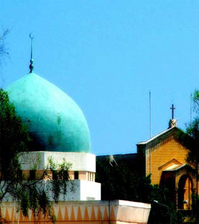 Jesus told us to ask His Father for that which we need because we radically depend on Him. We are bold to bring to God the Father, in the name of Jesus, under the power of the Holy Spirit, the following needs that Pope Benedict named for the Church:
Jesus told us to ask His Father for that which we need because we radically depend on Him. We are bold to bring to God the Father, in the name of Jesus, under the power of the Holy Spirit, the following needs that Pope Benedict named for the Church:
The general intention
That every tendency to fundamentalism and extremism may be countered by constant respect, by tolerance and by dialogue among all believers.
The missionary intention
That Christians persecuted for the sake of the Gospel may persevere, sustained by the Holy Spirit, in faithfully witnessing to the love of God for the entire human race.
